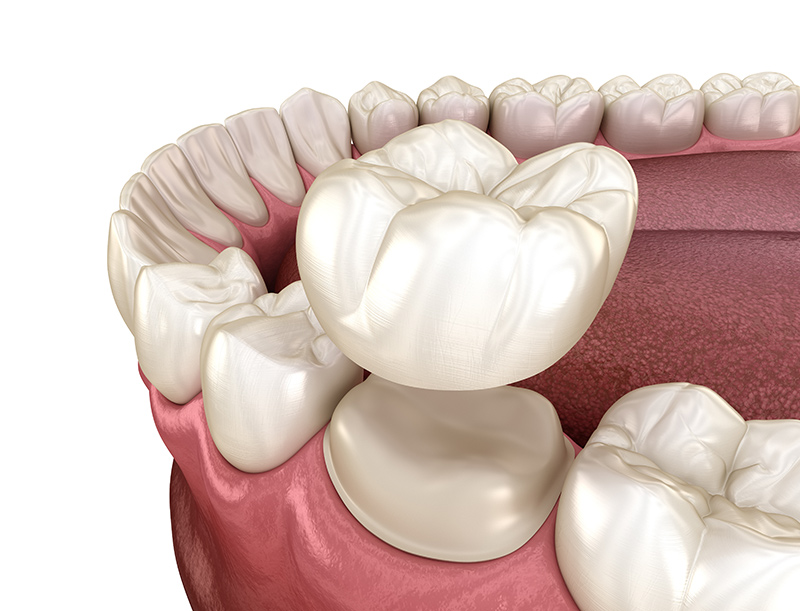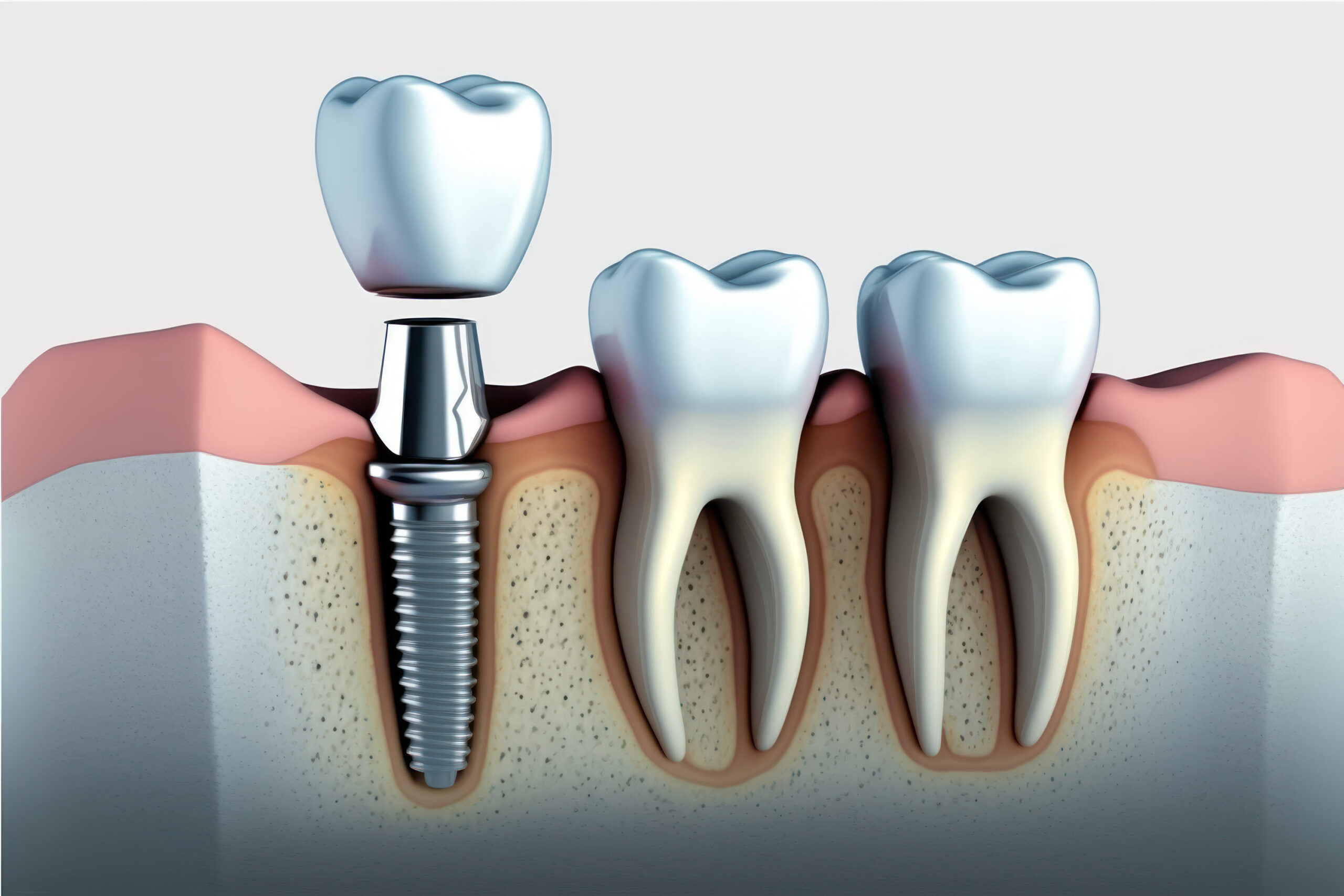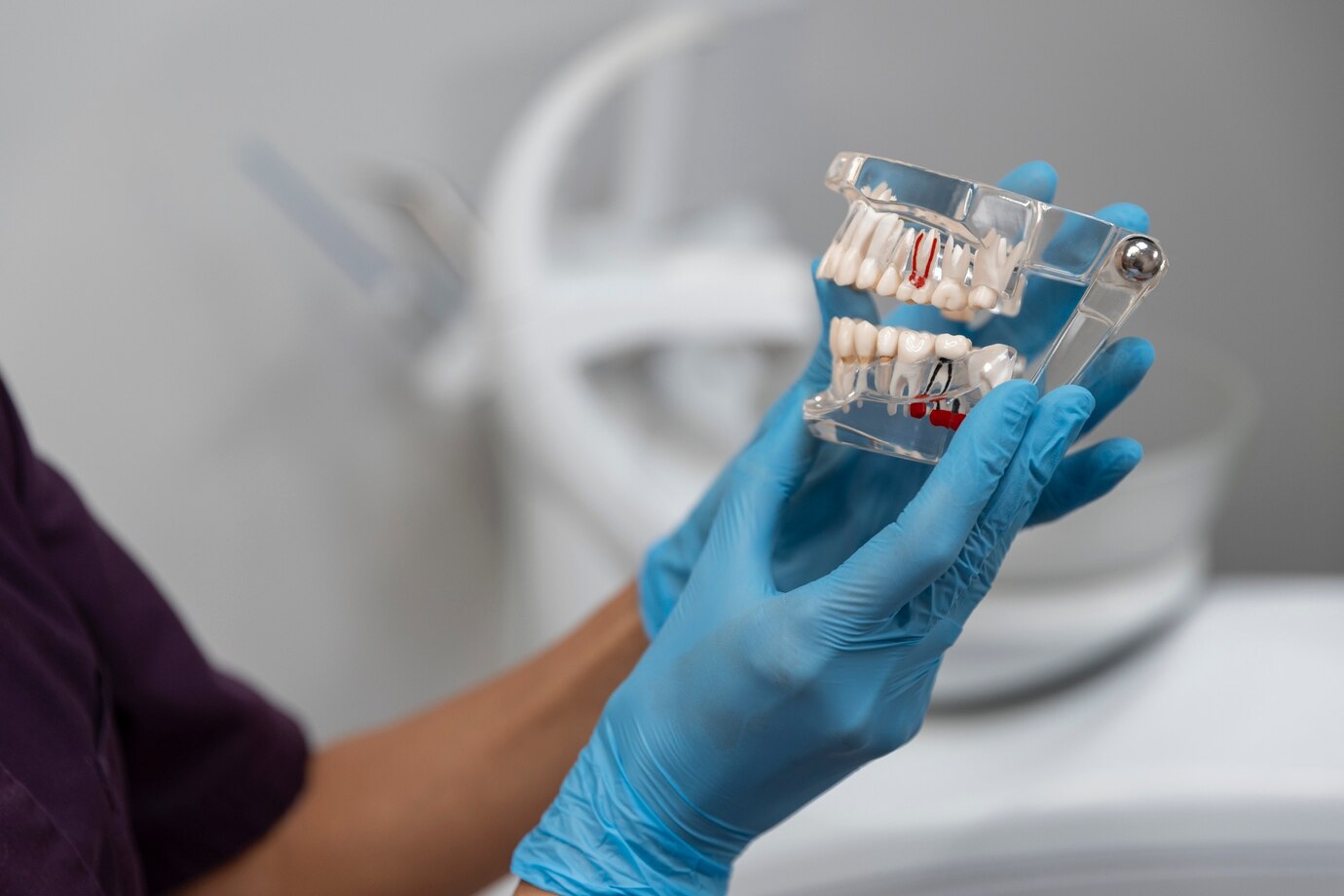Dental Crowns Fayetteville, NC
Dental crowns, or tooth caps, are dental prosthetic devices that protect teeth weakened by decay and trauma. Dental crowns cover the weakened tooth, restoring its functionality, strength, and natural appearance.
Your dentist in Fayetteville may recommend dental crowns if alternative treatments like dental fillings cannot restore the damaged tooth. Crowns are an effective restorative solution since they can last many years with proper care and maintenance.

Types of Dental Crowns
Porcelain-Fused-to-Metal
Porcelain-Fused-to-Metal Crowns are made of a metal core overlaid with a porcelain coating. The crown has a natural look, while the metal core provides strength and stability to the crown.
Porcelain-Fused-to-Metal Crowns fulfill aesthetic and functional needs making them a practical choice for front and back teeth.
All-Ceramic or All-Porcelain
All-ceramic or all-porcelain crowns are crafted entirely from ceramic or porcelain materials. They can be customized to match your natural tooth color, making them a popular choice for front teeth.
Your dentist may recommend ceramic crowns if you have metal allergies. However, since they lack a metal core, these crowns are less durable than porcelain-fused-to-metal crowns.
Some all ceramic crowns such as zirconia have shown as much durability or more durability than a Porcelain-Fused-to-Metal Crown.
Metal
Metal crowns are made of neutral metal alloys. They are resistant to corrosion and chipping. They can withstand immense biting forces, making them a popular choice for back molars. Metal crown alloys can contain gold, copper, chromium, and nickel metals.
However, these crowns lack the aesthetic appeal of porcelain-fused-to-metal crowns, making them unsuitable for front teeth.
Pressed Ceramic
Pressed ceramic crowns are made by heating a unique dental ceramic material, shaping it in a mold, and hardening it under high pressure. The result is a natural-looking, highly aesthetic crown with a strong, durable core. Pressed ceramic crowns are more resilient than all-ceramic or all-porcelain crowns. Your dentist may recommend them for back teeth.

Reasons for Getting Dental Crowns
Protection and Preservation of Damaged Teeth
Tooth decay, trauma, or dental procedures such as root canal treatments can significantly weaken a tooth. Placing a dental crown over the weakened tooth can protect it from eroding external factors such as oral bacteria and acids, preserving it for many years.
Restoration of Teeth
Compulsive teeth grinding, decay, trauma, and other factors can wear down a tooth, weakening its structure and severely reducing its functionality. A dental crown can restore the worn tooth’s height, its chewing surface, and structural integrity.
Aesthetic Enhancement for Teeth
Genetics, acidic foods, tobacco smoke, and certain medications can contribute to the discoloration and distortion of natural teeth. Since crowns integrate seamlessly with surrounding teeth, they can be placed over the misshapen or discolored tooth to restore its natural look, enhance its appearance and improve your smile.
Bite Correction
Misaligned teeth can cause difficulty chewing, jaw pain, and contribute to excessive teeth grinding. Your dentist can restore balance to your bite by using dental crowns to correct the shape, size, and position of the misaligned teeth. Orthodontic treatment such as traditional braces or Invisalign is the number one option to correct misaligned teeth. Your dentist will likely recommend this option before recommending crowns.
Dental Crown Placement Procedure
Evaluation
First, your dentist performs an oral evaluation to determine whether a dental crown is a viable treatment for the weakened tooth. They may physically examine the tooth and take dental X-rays to evaluate the degree of damage or decay.
Dental Crown Preparation
Next, the dentist prepares the weakened tooth for dental crown placement. This process involves cleaning the tooth and removing decay, damaged tissue, or food particles. Various specialized tools may be used to clean the tooth, including a dental excavator to scoop out food particles or a dental drill to dislodge decay deep in the tooth.
Additionally, the dentist may have to build up the tooth if it has significant structural damage. They will use a filling material to restore the tooth’s form and provide a stable foundation for the crown.
Impression
Once the preparation is complete, the dentist will use a dental dam to isolate the weakened tooth keeping it free from saliva. Using a doughy material made from silicone, he will then create an impression of the weakened tooth.
The dentist positions a dental tray holding the impression material beneath the weakened tooth. They will instruct you to bite down on the tray. Once the impression material hardens, the dentist removes the tray and sends the mold to the lab, where a custom crown will be fabricated.
Note your dentist may create digital impressions of the affected tooth using a digital scanner. Since fabricating a permanent crown can take a few weeks, the dentist may place a temporary crown over the weakened tooth, protecting it while you wait for the final fitting.
Dental Crown Fitting
Your dentist will schedule a fitting appointment once the permanent crown is ready. After removing the temporary crown, he will clean and dry the weakened tooth in preparation for the permanent crown. Next, the dentist carefully places the permanent crown over the affected tooth.
Before cementing the crown, the dentist ensures that the crown color blends with the surrounding teeth and doesn’t interfere with your bite.
Dental Crown Cementing
After confirming that the crown fits, the dentist bonds it to the weakened tooth using a special dental cement. Note that the crown type and your tooth’s condition determine the type of dental cement chosen for the bonding process.
The dentist applies the cement inside the crown and carefully places it over the weakened tooth. Finally, they carefully adjust the crown to ensure it is properly aligned with the surrounding teeth before hardening the cement using a special curing light. Once the dental cement hardens, the dentist will ensure it fits snugly over the tooth.
Aftercare for Dental Crowns
Following a proper aftercare routine prevents complications with your dental crown and ensures its durability. Your dentist may recommend the following general dental crown maintenance tips:

- Proper oral hygiene: Maintaining proper hygiene prevents plaque buildup around the crown lowering the risk of gum disease. However, it would be best if you brushed gently to avoid irritating the gums and dislodging the crown
- Watch your diet: After the dental crown placement, you should stick to soft foods like pudding, tender meats, and vegetables. Avoid hard foods like nuts and popcorn that can fracture or loosen the crown
- Attend regular dental checkups: It would be best if you attended all dental checkups scheduled by your dentist. They will monitor your crown and address any complications that may arise. Moreover, they may help clean the crown if it’s in a hard-to-reach area of the mouth
- Protect your teeth: Take precautions to keep your teeth safe. For instance, always wear a mouthguard if you participate in sports with a high risk of dental injury. Furthermore, avoid using your teeth to open bottle caps or packaging, as this can dislodge the dental crown
Cost of Dental Crowns
You should consult with your dentist to obtain accurate information on your dental crown placement cost. However, the following factors can affect dental crown costs:
- Insurance coverage: Your insurance package may cover the entire procedure or a portion of the dental crown cost. As such, a comprehensive dental insurance plan reduces your expense.
- Material: Dental crown cost varies depending on the crown material. For instance, ceramic and porcelain crowns are aesthetically pleasing but cost more than metal crowns. Metal crowns such as gold crowns may cost more than ceramic crowns depending on the quantity of gold and the cost of gold at the current time.
- Location: Your location may significantly affect dental crown cost. For example, urban dental care facilities may charge more for dental crown placement than rural facilities.
- Nature of the procedure: Dental crown cost varies depending on the nature of your procedure. For example, the overall cost will be higher if dental fillings and other treatments are needed before placing the crown.

Frequently Asked Questions
Are Crown Procedures Painful?
While dental crown placement is a relatively non-invasive procedure, your dentist will use local anesthesia to numb the gums surrounding the tooth. Moreover, your dentist may prescribe painkillers to help alleviate discomfort after the procedure.
Are Crowns Replaceable?
Yes, dental crowns are replaceable. Your dentist may replace your crown if it becomes damaged or you wish to switch to a different type of dental crown. It is also possible to develop decay under an existing crown which will make it necessary to replace the crown.
Are There Any Risks Associated With Crown Procedures?
Dental crown procedures may cause nerve damage, infection, allergic reactions to the crown material, sensitivity, and gum disease. However, these complications rarely occur and can be prevented by following your dentist’s aftercare instructions.
Are Crowns Durable?
The material a dental crown is made from determines its longevity. However, dental crowns are remarkably resilient. Some crown types can last for more than ten years with proper care.
Dental crowns are an affordable and effective dental treatment for protecting and restoring damaged teeth. Crowns can enhance your speech, restore chewing function, improve your smile, and boost your confidence. If you’re concerned about a damaged tooth, consult your dentist to determine if a dental crown may be the best restorative treatment for you.
Schedule Today!
We look forward to meeting you. Call (910) 446-9027 or request an appointment online to set up your first visit. We’ll be in touch soon.
O2 Dental Group of Fayetteville
(910) 446-9027
Monday:
Tuesday:
Wednesday:
Thursday:
Friday:
Saturday:
Sunday:
8:00am – 6:00pm
8:00am – 6:00pm
8:00am – 6:00pm
8:00am – 6:00pm
8:00am – 4:00pm
CLOSED
CLOSED

